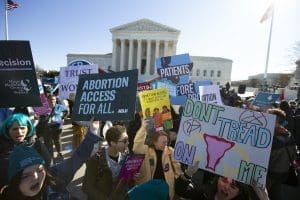Thousands who've had abortions write to Supreme Court ahead of challenge to Roe v. Wade
Activists are using amicus briefs to show that people can thrive after they have abortions.

Once the U.S. Supreme Court agreed to hear Dobbs v. Jackson Women’s Health, the Mississippi case about whether previability abortion bans can ever be constitutional, the battle of the amicus briefs was on. Now, activists are using those briefs to shape a narrative of what it means to have an abortion.
Interested parties can request to file a brief at the Supreme Court as a “friend of the court” or amicus. Under the court’s own rules, amicus briefs are designed to “bring[] to the attention of the Court relevant matter not already brought to its attention by the parties” to help the court make its decision. In hot-button cases, the court receives scores of these briefs. In Dobbs, anti-abortion groups filed over 70 amicus briefs, and abortion rights advocacy groups have thus far filed more than 50.
Several of these briefs aren’t necessarily designed to raise points of law. Rather, they’re designed to talk about what it means to have an abortion.
The anti-abortion group Priests for Life filed a 103-page brief, over 90 pages of which are stories from people who said they had an abortion and later regretted it. On the other side of the case, Advocates for Youth and We Testify filed a similar amicus brief with narratives from people who had an abortion.
There’s one big difference between the briefs, however. The Priests for Life stories are anonymous, with only first names given and often little to no information about where the abortion occurred. In contrast, Advocates for Youth and We Testify shared 26 stories from individuals who had abortions and wanted to put their names to their stories. Another 6,641 people from all 50 states signed the brief.
The brief isn’t just stories, though. Rather, it uses those stories to talk about a key legal reason for keeping Roe v. Wade intact — that of reliance. Courts are generally required to adhere to past precedent, a process known as stare decisis. When the Supreme Court assesses whether to depart from those past precedents, one of the things it must look at is a reliance interest. As it relates to Roe, this refers to how people have come to “order[] their thinking and living” around Roe being good law and abortion being legal.
The brief uses that concept as a jumping-off point to talk about all the ways in which people have come to rely on the availability of abortion.
For example, one of the principles of constitutional liberty, the brief notes, is that of bodily integrity — the right to make your own decisions about your own body, be that about refusing forcible stomach pumping or being able to access birth control. The brief says that Americans also have the right to be “autonomous individuals who cannot be forced to bear children they did not consent to conceive.” Tied to that legal principle are the stories of two young people who were sexually assaulted but were able to get abortions, which allowed them their bodily autonomy.
The brief offers other examples: People also order their lives around the principle that they can maintain their physical or mental health by having an abortion if necessary. They order their lives around the availability of abortion if having one would allow them to avoid going on public assistance. And for every reliance interest, a story.
The brief takes the power of storytelling to the court, and that is valuable. However, the stories it tells — that people do not regret their abortions, but rather instead can thrive if allowed to obtain one — is one already borne out by research. The Turnaway Study looked at nearly 1,000 people over 10 years. It found that, far from causing regret, 97.5% of people who had an abortion, when asked by the study one week afterward, said they did not regret it. When the study followed up with them five years later, the percentage had increased to 99%.
Conversely, the Turnaway Study found that when people were not allowed to get abortions — when they couldn’t rely upon its availability, when they weren’t able to order their lives around it — significant negative consequences arose. Being denied access to abortion contributed to serious financial distress, even years afterward. If people can’t have abortions, they’re more likely to stay tethered to a violent partner.
Advocates for Youth and We Testify brought the power of storytelling to the court, and that storytelling highlights what was already known: Not being able to access abortion causes far worse consequences than having one.
Published with permission of The American Independent Foundation.
Recommended

Veto overrides push Kansas anti-abortion bills into law, while Louisiana seeks to protect IVF
Abortion-related bills continue to be introduced and debated in legislatures across the country, especially in states where the procedure is already banned.
By Kelcie Moseley-Morris, Idaho Capital Sun - May 10, 2024
Missouri Planned Parenthood clinics remain ‘open to all’ despite new Medicaid restrictions
Planned Parenthood says they will continue offsetting the costs of seeing patients on Medicaid despite a bill signed into law Thursday
By Anna Spoerre, Missouri Independent - May 09, 2024
Fate of ‘game changer’ women’s health care bill in hands of Missouri Senate
A bill that would improve health care access for Missouri women almost died in the House after some lawmakers conflated birth control legislation with abortion medication
By Anna Spoerre, Missouri Independent - May 08, 2024












































































